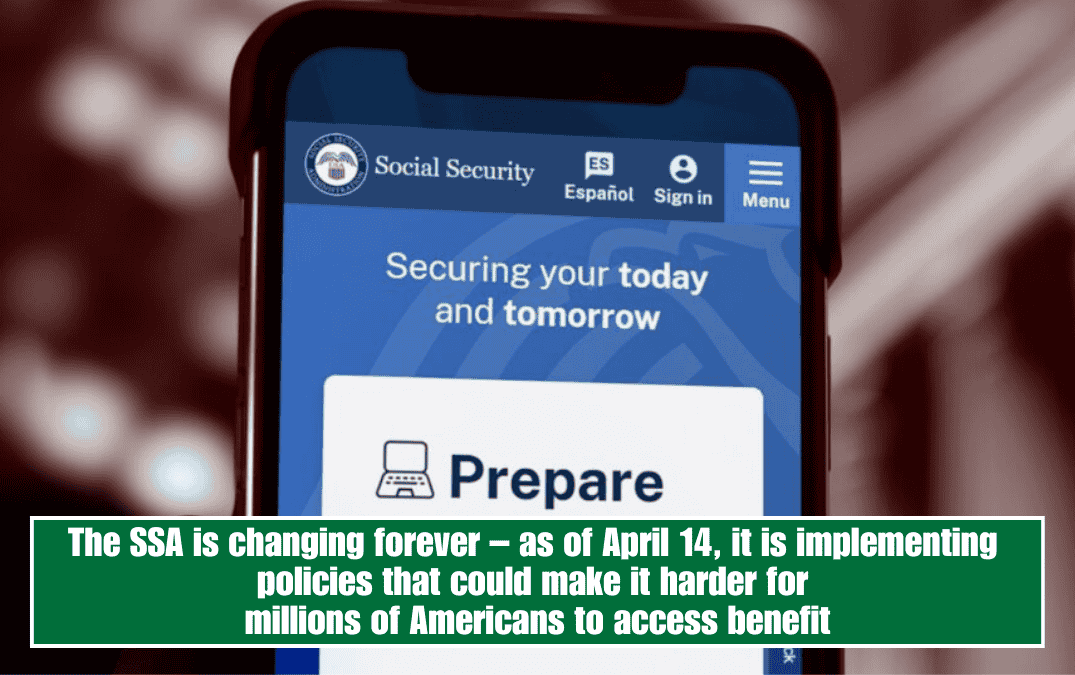Millions of Seniors May Face New Challenges Accessing Social Security from April 14
Starting April 14, 2025, a major change in how Americans verify their identity for Social Security services could make it harder for millions—especially seniors—to access their benefits. The Social Security Administration (SSA) will no longer allow identity verification over the phone for certain services. From now on, people must either go online or visit a local SSA field office to prove their identity.
While this policy is meant to prevent fraud, it may unintentionally create serious barriers for older adults and those with disabilities, especially those living in rural or remote areas.
What Exactly Is Changing?
This new SSA rule affects anyone who:
- Wants to apply for new Social Security benefits
- Wants to update or change their direct deposit information
However, the change does not affect those already receiving:
People in these categories will continue using current verification methods. But others, including many older adults applying for retirement or survivor benefits, will now be required to use online systems or visit an office in person.
Why Seniors Could Be Hit the Hardest
For many older adults, the shift away from phone verification is more than just inconvenient—it’s a serious problem. According to a report by the Center on Budget and Policy Priorities (CBPP), nearly 6 million seniors will need to travel more than 45 miles to reach a Social Security office if they can’t verify their identity online.
Here’s why this is troubling:
- Over 8 million seniors in the U.S. live with a disability or medical condition that makes travel difficult
- More than 6 million seniors no longer drive
- In 35 states, at least 10% of Social Security recipients will face long round trips to get to a local office
The problem is even worse in states like:
- Wyoming, where 65% of seniors live over 45 miles from the nearest SSA office
- Alaska, where nearly 46% face similar travel issues
- North Dakota, where around 13,000 seniors may have to travel over 180 miles for in-person identity checks
In contrast, more populated states such as California and New York are less affected—only around 3% of seniors there face long-distance travel.
Why Phone and Online Access Matter
Historically, more than 40% of Americans apply for Social Security benefits over the phone, and this method has been especially helpful for those who cannot travel or navigate the internet. There is currently no online option for survivor benefit claims, and children cannot open online SSA accounts, leaving families with no choice but to visit an office.
For these people, the removal of phone verification could mean losing access to the benefits they need.
What the SSA Says About the Change
In response to criticism, the SSA has denied that they are cutting phone services. A statement given to Newsweek said:
“SSA is NOT limiting phone services for Americans. We have over 40,000 people working the front lines and will continue to ensure benefits are available to all Americans.”
The agency also added that it has returned employees to physical offices full-time and is investing in improving phone services. Still, experts and senior advocates believe the new rules could have serious consequences for vulnerable groups.
What Experts and Advocacy Groups Are Saying
The CBPP and other advocacy organizations are urging the SSA to rethink or adjust this policy. They say that:
“Telephone services are critical for seniors and people with disabilities, who may struggle to access online portals and may face barriers to traveling to field offices—even if one exists in their area.”
They emphasize that seniors should not lose access to their benefits just because they lack internet access or live far from a Social Security office.
The SSA’s upcoming policy change on April 14 may affect millions of Americans, particularly seniors and people with disabilities. While the intention is to prevent fraud and protect benefits, the side effects could be severe. Long travel distances, lack of internet, and reduced access to phone services may block many from the support they need.
As the SSA rolls out this new rule, there is increasing pressure from advocacy groups to keep phone-based identity verification as an option. For many, it’s the only way to stay connected to the benefits they’ve earned over a lifetime of work.















